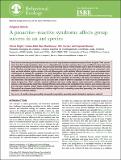Por favor, use este identificador para citar o enlazar a este item:
http://hdl.handle.net/10261/146002COMPARTIR / EXPORTAR:
 SHARE SHARE
 CORE
BASE CORE
BASE
|
|
| Visualizar otros formatos: MARC | Dublin Core | RDF | ORE | MODS | METS | DIDL | DATACITE | |

| Título: | A proactive-reactive syndrome affects group success in an ant species |
Autor: | Blight, Olivier; Albet Díaz-Mariblanca, Gisela; Cerdá, Xim CSIC ORCID ; Boulay, Raphaël | Palabras clave: | A. senilis Trade off Proactive-reactive behavioral syndrome Intraspecific competition Colony personality |
Fecha de publicación: | 2016 | Editor: | Oxford University Press | Citación: | Behavioral Ecology 27: 118- 125 (2016) | Resumen: | Social insects have been particularly evolutionarily successful: they dominate terrestrial ecosystems all over the globe. Their success stems from their social organization, where one or a few individuals reproduce, whereas others carry out different colony tasks. From an evolutionary standpoint, social species are particularly interesting because natural selection acts at both the individual and colony levels. Therefore, we might expect to see selection acting simultaneously on personality at the individual level and colony level. In this study, we tested whether captive colonies of the ant Aphaenogaster senilis exhibited different behavioral types and evaluated their consequences for intraspecific competition. Our results demonstrate that colonies of the same age exposed to standardized laboratory conditions did indeed have different personalities. In addition, we found that A. senilis demonstrated a behavioral syndrome that included proactive and reactive behaviors: colonies varied in their approaches to exploration, risk taking, food retrieval, and conspecific interactions. This syndrome appears to be associated with a trade-off between competition for food resources and temperature-related foraging risks. >Bold> colonies contained individuals who more readily explored novel environments, exhibited aggressive behaviors, and demonstrated higher food-retrieval efficiency during intraspecific competition trials. However, such colonies were also more risk prone: workers suffered higher mortality rates because they more frequently foraged over their critical thermal maximum. The trade-off we observed under laboratory conditions might be key in maintaining colony-level personality, thus driving local-level adaptations in collective behavior. | URI: | http://hdl.handle.net/10261/146002 | DOI: | 10.1093/beheco/arv127 | Identificadores: | doi: 10.1093/beheco/arv127 issn: 1465-7279 |
| Aparece en las colecciones: | (EBD) Artículos |
Ficheros en este ítem:
| Fichero | Descripción | Tamaño | Formato | |
|---|---|---|---|---|
| arv127.pdf | 1,8 MB | Adobe PDF |  Visualizar/Abrir |
CORE Recommender
SCOPUSTM
Citations
38
checked on 09-abr-2024
WEB OF SCIENCETM
Citations
39
checked on 24-feb-2024
Page view(s)
261
checked on 16-abr-2024
Download(s)
200
checked on 16-abr-2024
Google ScholarTM
Check
Altmetric
Altmetric
NOTA: Los ítems de Digital.CSIC están protegidos por copyright, con todos los derechos reservados, a menos que se indique lo contrario.
